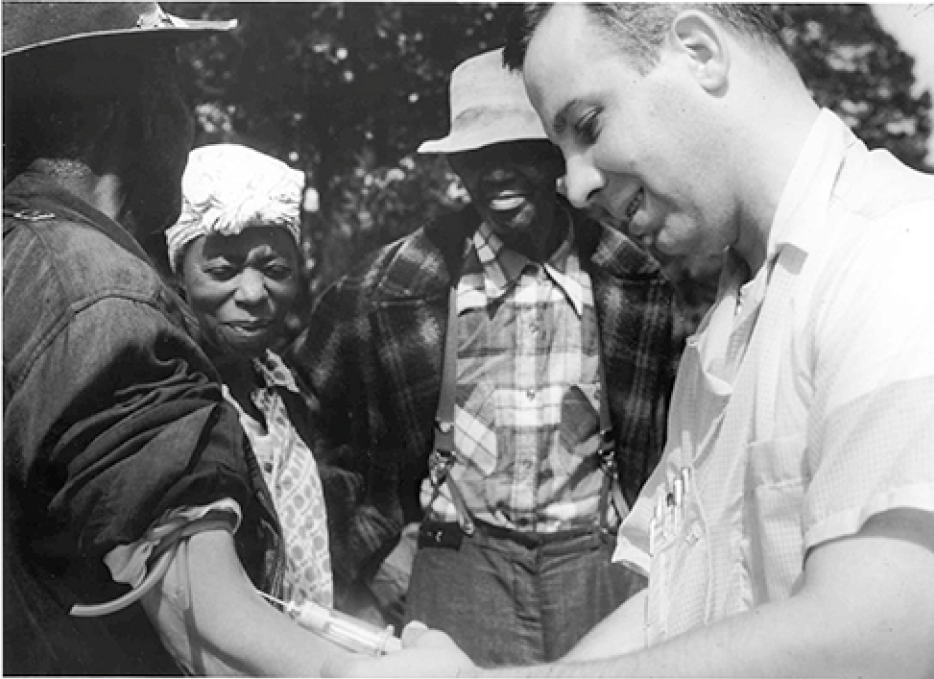170 Tuskegee Syphilis Experiment
Adapted with modification from
Psychology 2e
https://openstax.org/details/books/psychology-2e?Book%20details
Published: 4/22/2020
Digital ISBN-13: 978-1-951693-23-7; retrieved 3/15/2022
License:
CC BY by OpenStax is licensed under Creative Commons Attribution License v4.0
Ethics and the Tuskegee Syphilis Study
Unfortunately, the ethical guidelines that exist for research today were not always applied in the past. In 1932, poor, rural black male sharecroppers from Tuskegee, Alabama, were recruited to participate in an experiment conducted by the U.S. Public Health Service, with the aim of studying syphilis in black men (Figure 2.21). In exchange for free medical care, meals, and burial insurance, 600 men agreed to participate in the study. About two thirds of the men (399) tested positive for syphilis, and they served as the experimental group (given that the researchers could not randomly assign participants to groups, this represents a quasi-experiment). The remaining syphilis-free individuals (201) served as the control group. However, those individuals that tested positive for syphilis were never informed that they had the disease. While there was no treatment for syphilis when the study began, by 1947, penicillin was recognized as an effective treatment for the disease. Despite this, no penicillin was administered to the participants in this study, and the participants were not allowed to seek treatment at any other facilities if they continued in the study. Over the course of 40 years, many of the participants unknowingly spread syphilis to their wives (and subsequently their children born from their wives) and eventually died because they never received treatment for the disease. This study was discontinued in 1972 when the experiment was discovered by the national press (https://apnews.com/article/business-science-health-race-and-ethnicity-syphilis-e9dd07eaa4e74052878a68132cd3803a). The resulting outrage over the experiment led directly to the National Research Act of 1974 and the strict ethical guidelines for research on humans described in this chapter. Throughout history, race has been divisive and, in some cases, a discouraging factor in scientific inquiry. Why is this study unethical? How were the men who participated and their families harmed as a function of this research?

Link to learning:
Visit this website about the Tuskegee Syphilis Study https://www.cdc.gov/tuskegee/timeline.htm to learn more.
https://www.tuskegee.edu/about-us/centers-of-excellence/bioethics-center/about-the-usphs-syphilis-study and more about events after the study from the Legacy Committee: https://www.tuskegee.edu/Content/Uploads/Tuskegee/files/Bioethics/SyphilisStudyCommitteeReport.pdf
As a consequence, Tuskegee University created the nation’s first bioethics center to study moral and ethical question in research and medical treatment of African Americans and other underserved people. The National Center for Bioethics in Research and Health Care received seed funding 2 years after the public apology of the President of the United States about the terrible, “deeply, profoundly, morally wrong” study, a study that was “clearly racist” (words in quotes are from the public apology May 16 of 1997 made by the US President).
Many very serious ethical questions arise from the Tuskegee study. Due to the egregious nature of the harm done, readers should discuss this topic and ethical questions in a larger forum and allow outmost flexibility of discussion. Listing some ethical questions might be too insensitive and might also unintentionally confine the needed space and flexibility for larger discussions.

